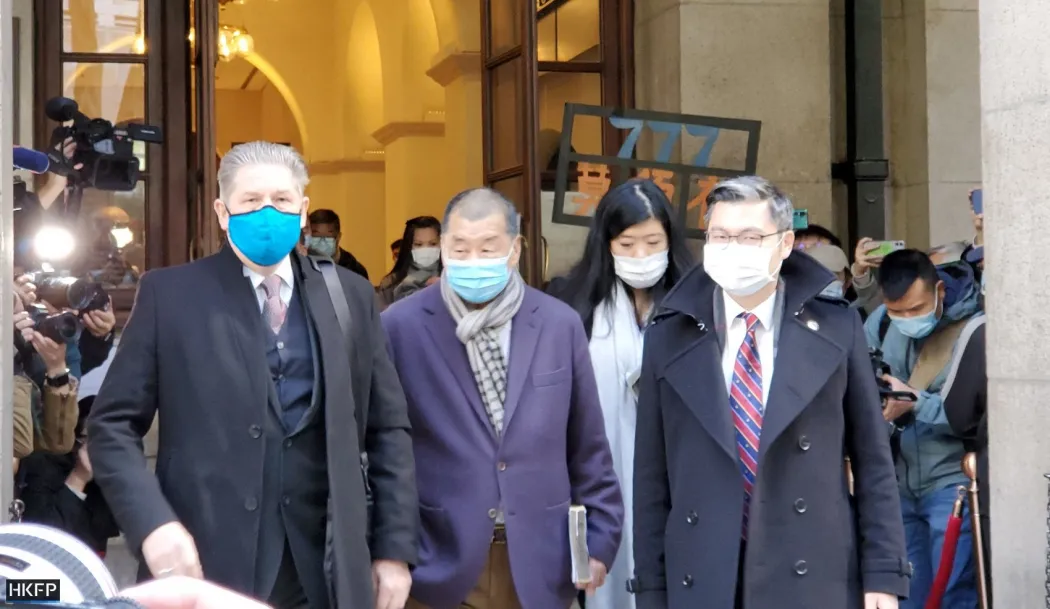Hong Kong’s top court has approved a leave for an appeal against the decision to extend bail to pro-democracy media tycoon Jimmy Lai. He remains effectively under house arrest pending trial for offences linked to the Beijing-enacted national security law and alleged fraud.
The Court of Final Appeal ruled on Thursday that the Department of Justice (DoJ) could challenge the High Court’s decision to release the 73-year-old mogul on bail last week after he was remanded in custody for almost one month.

It also ruled that Lai could be kept in custody while awaiting the court’s bail ruling.
The bid for appeal was heard by outgoing Chief Justice Geoffrey Ma and his incoming successor Justice Andrew Cheung, as well as Justice Roberto Ribeiro. The Chief Executive’s Office confirmed with local media that the three were among a list of judges handpicked by leader Carrie Lam to handle national security cases.
The High Court released Lai on HK$10 million cash bail before Christmas on condition that he remains in his residence and surrenders his travel documents. He was banned from taking part in media interviews and posting on social media.

According to local media, the High Court said in a written reasoning on Tuesday that the bail applicant proposed various conditions, it believed the chances of the defendant fleeing and recidivism were not high.
The Chinese Communist Party mouthpiece People’s Daily slammed the decision to grant bail to Lai as “inconceivable” on Sunday, saying the newspaper owner was “notorious and extremely dangerous.”

The editorial questioned whether local courts had “jurisdiction difficulty” and urged them to make a “right decision” after the DoJ filed an urgent appeal to put Lai back in custody.
Security law
In a written ruling, the appeal committee said the prosecution put forward two questions – whether the top court had jurisdiction to hear an appeal against a judge’s grant of bail, and the construction of Article 42 of the national security law.
Article 42 of the national security law stipulates that no bail shall be granted to a criminal suspect or defendant unless the judge has sufficient grounds for believing that the individual will not continue to commit acts endangering national security.
Lai’s lawyers argued while bail may be revoked and its conditions may be changed when courts see fit, such power should lay with the High Court judge, and the top court did not have to assume jurisdiction. But the prosecutors argued such grant of bail was a “final decision as against the prosecution,” which could be heard by the top court which only adjudicates applications related to a lower court’s “final decision.”
The top court judges said the second question raised by the prosecution raised important questions about the ambit and effect of Article 42 of the national security law, as well as the provisions linked to the civil and political rights guaranteed under the Bill of Rights Ordinance and the Basic Law. The ruling stated that it was arguable that the “Judge may have erred in his construction or application of NSL Article 42(2) in adopting his approach to the grant of bail in the light of the requirements of that Article.”
The CFA judges said the second question will be of “limited nature” when it is heard at the appeal hearing: “The Court will determine the meaning of NSL Article 42(2) and, having done so, will decide whether the Judge fell into error in his approach to the grant of bail.”
The DoJ asked the appeal committee to send Lai back in custody as a “return to the status quo” before the High Court judge’s bail decision which is under challenge. Ma, Cheung and Ribeiro said that allowing Lai to remain on bail would assume the validity of the High Court judge’s order and ordered Lai to be held in pending determination of the appeal or until further order.
‘Collusion’ charges
Lai stands accused of endangering national security by colluding with foreign powers. The prosecution cited his activity on Twitter and interviews with international media as proof that the democracy campaigner used multiple ways to ask overseas governments to impose sanctions on Hong Kong and China.

The sweeping security legislation also outlaws secession, subversion and terrorist acts – broadly defined to include disruption to public transport and other infrastructure. The four offences are punishable by life imprisonment.
Lai is also facing charges linked to an alleged breach of office land-lease terms along with Wong Wai-keung and Royston Chow, who are senior executives of Next Digital.
The media mogul resigned as the executive director and the board chairman of Next Digital on Tuesday, saying he wanted to “spend more on dealing with his personal affairs.” Lai founded the company in 1981, which owns Apple Daily, the self-proclaimed “most outspoken pro-democracy media in Hong Kong.”
Lai’s next court appearance is scheduled for February next year.
Support HKFP | Policies & Ethics | Error/typo? | Contact Us | Newsletter | Transparency & Annual Report | Apps
Help safeguard press freedom & keep HKFP free for all readers by supporting our team























